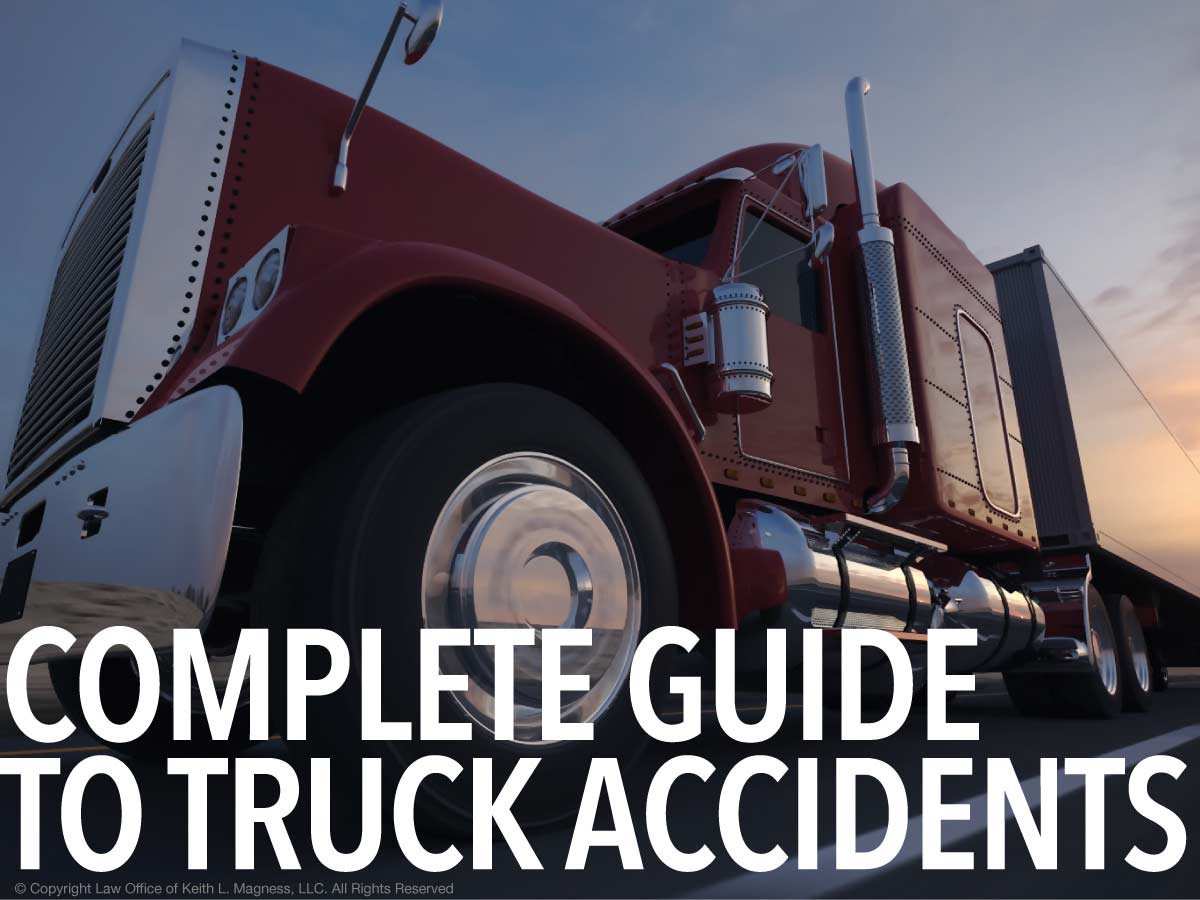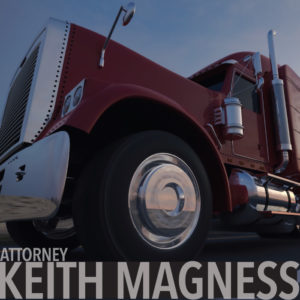A Complete Guide to Commercial Truck, Semi Truck, and 18-Wheeler Accidents
(Last Updated: May 5, 2022)
If you’ve been injured in a truck accident in New Orleans, please contact our office for a free attorney consultation.
A commercial truck in New Orleans is any vehicle used in the course of business and/or for the transport of commercial goods. Examples include: 18-wheeler tractor trucks, semi trucks, tanker trucks, delivery vehicles, and other large freight trucks. Standard pick-up trucks and vans are generally not included in this category, even though they are often used for commercial purposes.
About 15.5 million trucks are currently driving on U.S. roadways. Two million of these, approximately 13 percent, are semis, big rigs, 18-wheelers, and tractor-trailers. About 3.5 million Americans are licensed truck drivers. Each year, approximately 500,000 truck accidents occur on U.S. roadways, and about 130,000 individuals are injured each year in truck collisions. For every 100 million miles driven on U.S. roadways, there are 2.3 deaths and 60.5 injuries caused by big rigs.
Commercial trucks, when fully-loaded, can weigh 80,000 pounds or more, while an average automobile weighs approximately 3,000 pounds. Due to this disparity in size, and the basic laws of physics, any collision between a big rig or other commercial truck and a smaller passenger vehicle is likely to result in serious, even fatal, injuries. In addition, truck accidents can be made worse if the freight that the truck is carrying is made up of hazardous or flammable materials, such as gasoline or industrial waste.


What to Do If You’ve Been in an 18-Wheeler or Commercial Truck Accident
The first thing that a driver or passenger should do after an accident with a truck is call the police, and then stay on the scene until they arrive. If possible, the driver should begin recording all the pertinent information about the accident and all those involved. These will include:
- Details about the Trucking Company and Driver – The name of the trucking company; the name of the driver; the truck’s license plate number; any other license numbers or identifying details about the truck; the driver’s Commercial Driver’s License (CDL) number; any other companies or business entities associated with the truck or driver; the truck driver’s insurance information
- Specific Details about the Truck Accident – How the accident occurred; the condition of the road and weather; what vehicles were involved; the names and addresses of any witnesses. Photos of the accident scene and the vehicles involved.
A commercial truck driver has similar responsibilities as the driver of a passenger car when involved in an accident, plus the added task of filing a comprehensive accident report that includes all the pertinent information about the accident and all the parties and vehicles involved. The report should include detailed information about any physical injuries or property damage caused by the accident, and the role played by each involved party should be recorded as accurately as possible: the time, date, location, the position of the colliding vehicles, weather and traffic conditions, and any other relevant factors. The driver should refrain from admitting fault because he or she may not know whose fault it may actually be under the state laws. The driver should also refuse to sign any document or statement except for what the police may officially require.
When to Contact an Attorney after a Truck Accident in New Orleans
If you’ve been injured in an accident involving a truck or 18-wheeler in New Orleans or Louisiana, you may be entitled to compensation for the medical costs to treat your injuries, address property damage to your vehicle, recover lost wages and be compensated for your pain and suffering. It is important to contact an attorney to review your specific situation and determine the best way to move forward, to ensure that you are treated fairly and honestly by the insurance company and all parties (including your attorney) involved in the claims process.
Contact an Experienced Motorcycle Accident Attorney for a Free Consultation »
If you’ve been involved in a commercial truck or 18-wheeler accident, know the 18 mistakes that can damage your auto or truck accident claim in Louisiana. Additionally, it’s important to know that the friendly insurance adjuster and is not your friend. Their job is to minimize your claim, so make sure to be aware of the secrets that insurance adjuster won’t tell you about your claim.

Determining Responsibility or Liability In a Truck Accident
When it comes to truck accidents in New Orleans and elsewhere, there are many parties who may be responsible for injury and/or property damage: the truck’s driver; the owner of the truck or trailer; the person or company that may have leased the truck or trailer from the owner; the manufacturer of the vehicle, its tires, or other parts the may have contributed to the cause or severity of the accident; and/or the shipper or loader of the truck’s cargo. Of course, the driver of the passenger car may also be at fault.
The best way to determine legal liability for a truck accident is to confer with a qualified truck accident attorney. Accident victims may be entitled to recover compensation for any injuries or damages incurred, even if they are partially responsible, under Louisiana’s comparative negligence theory which allocates fault to each party according to how much their behavior was a contributing cause of the accident. Compensation may be claimed for medical expenses, pain and suffering, lost wages, lost earning capacity, and loss of companionship.
While many people seeking compensation for a truck accident will opt to file suit in a court of law, there are other options available, including settling out of court, mediation, and arbitration. There are benefits and drawbacks for each of these strategies, and thus, the services of a competent attorney are strongly advised.
Trucking Law in the United States
The trucking industry in New Orleans and Louisiana is regulated by federal and state laws which must be followed by all trucking companies and all drivers, whether they are employed by a firm or are independent operators. The two primary federal agencies that regulate the trucking industry are the U.S. Department of Transportation (DOT) and its Federal Motor Carrier Safety Administration (FMCSA). Federal trucking regulations are contained in Title 49 of the Code of Federal Regulations. Each state also has its own Department of Transportation, which regulates intra-state trucking.
Drivers of commercial trucks must be properly licensed according to their state’s statutes. Drivers of large trucks are allowed by federal hours-of-service regulations to drive up to 11 hours at a stretch. The maximum weight a truck can haul is determined by its size.
All large commercial vehicles are further regulated with regard to both their manufacture and repair. For example, there are federal laws on air brake systems with standards to ensure safe braking performance under normal and emergency conditions. In addition, the U.S. DOT’s Office of Hazardous Materials Safety (OHMS) develops safety regulations for transporting hazardous materials on the nation’s roads and highways.
Common Causes of Truck Accidents
Because of their size and weight, commercial trucks, such as big rigs and delivery trucks, present unique dangers to smaller vehicles and their passengers. Both truck drivers and the drivers of the passenger cars, themselves, can be at fault, but the results of an accident between a large truck and a smaller car are almost always worse for the car. The most common type of unsafe act committed by car drivers who get in collisions with large trucks has to do with ignorance of a truck’s performance capabilities, such as limits associated with acceleration, braking, and visibility. Some of these unsafe acts include:
- Driving in the “No-Zone,” the areas behind and beside a commercial truck where the truck driver has limited or zero visibility
- Changing lanes abruptly in front of a truck
- Maneuvering to the right of a truck that is making a right turn
- Misjudging an approaching truck’s speed at an intersection, and making a left turn in front of the truck
- Merging improperly into traffic, causing a truck to maneuver or brake quickly
- Failure to slow down or speed up when a truck begins to change lanes or merge
- Unsafe passing, particularly with insufficient headway
- Passing a truck, then being blown out of position by air turbulence or cross-wind
- Pulling into traffic from the roadside in front of a truck without accelerating sufficiently
- Driving between large trucks
- Abandoning a vehicle in a travel lane, or failing to get a disabled vehicle completely off the highway and onto the shoulder
Although commercial truck drivers are generally considered the best and safest drivers on the road, they can also cause accidents. Those causes include:
- Inadequate training as to driving technique, safety concerns, and defensive driving
- Dangerous weather conditions such as extreme fog, rain, or snow
- Animals or debris in the road
- Operator negligence or unsafe maneuvering
- Sudden turning and/or braking that can cause a large vehicle, such as an eighteen-wheeler, to jackknife
- Turning from an inside lane or occupying two lanes
- Unrealistic schedules and expectations of trucking companies that encourage drivers to hurry, despite the safety risks involved
- Systems of compensation that encourage faster vehicle speeds and more hours of consecutive vehicle operation that would normally be advisable
- Driver fatigue or impairment
- Inadequately placed or overweight loads
- Tire blowouts, other mechanical malfunctions, or defective parts
Truck Accident Statistics
Large Truck and Bus Crash Facts (LTBCF) is a recurring annual report that contains descriptive statistics about fatal, injury, and property-damage-only crashes involving large trucks and buses. Information in the LTBCF report is compiled by FMCSA’s Analysis Division from four major sources:
- The National Highway Traffic Safety Administration’s (NHTSA’s) Fatality Analysis Reporting System (FARS), a census of fatal crashes involving motor vehicles traveling on public trafficways.
- NHTSA’s General Estimates System (GES), a probability-based sample of fatal, injury, and property-damage-only crashes.
- FMCSA’s Motor Carrier Management Information System (MCMIS) Crash File.
- The Federal Highway Administration’s (FHWA’s) Highway Statistics.
The following statistics are for large trucks only (no buses):
- In 2014, 3,744 large trucks were involved in fatal crashes; 88,000 were involved in injury crashes; and 346,000 were involved in property-damage-only crashes.
- About 98 percent of all semi accidents result in at least one fatality.
- About 75 percent of commercial truck accidents are caused by drivers of other smaller passenger vehicles, rather than the truck driver.
- Of the approximately 411,000 police-reported crashes involving large trucks in 2014, 3,424 (1 percent) resulted in at least one fatality, and 82,000 (20 percent) resulted in at least one nonfatal injury.
- Approximately 61 percent of all fatal crashes involving large trucks occurred on rural roads and 26 percent on rural or urban Interstate highways.
- Thirty-seven percent of all fatal crashes, 19 percent of all injury crashes, and 20 percent of all property-damage-only crashes involving large trucks occurred at night (6:00 pm to 6:00 am).
- The vast majority of fatal crashes (84 percent) and nonfatal crashes (88 percent) involving large trucks occurred on weekdays (Monday through Friday).
- Of the 3,697 drivers of large trucks involved in fatal crashes in 2014, 202 (5 percent) were 25 years of age or younger, and 216 (6 percent) were 66 years of age or older.
- Of the 3,697 drivers of large trucks involved in fatal crashes in 2014, 335 (9 percent) were not wearing a safety belt at the time of the crash; of those, 30 percent were completely or partially ejected from the vehicle.
- In 2014, at least one driver-related factor was recorded for 34 percent of the large truck drivers in fatal crashes, compared to 58 percent of the passenger vehicle drivers in fatal crashes. “Speeding of Any Kind” was the most frequent driver-related factor for drivers of both vehicle types; “Distraction/Inattention” was the second most common for large truck drivers, and “Impairment (Fatigue, Alcohol, Illness, etc.)” was the second most common for passenger vehicle drivers.
- There were 657 large truck occupant fatalities in 2014, of which 90 percent were drivers of large trucks and 10 percent were passengers in large trucks
- Single-vehicle crashes (including crashes that involved a bicyclist, pedestrian, nonmotorized vehicle, etc.) made up 21 percent of all fatal crashes, 14 percent of all injury crashes, and 23 percent of all property-damage-only crashes involving large trucks in 2014. The majority (63 percent) of fatal large truck crashes involved two vehicles.
- Hazardous Materials (HM) placards were present on 3 percent of the large trucks involved in fatal crashes and 2 percent of those in nonfatal crashes. HM was released from the cargo compartments of 12 percent of the placarded trucks in fatal and nonfatal crashes. Flammable liquids (gasoline, fuel oil, etc.) accounted for 49 percent of the HM releases from cargo compartments in fatal crashes and 57 percent of the HM releases in nonfatal crashes.
- “Collision with vehicle in transport” was recorded as the most harmful event for 73 percent of the large trucks involved in fatal crashes.
- Singles (truck tractors pulling a single semi-trailer) accounted for 63 percent of the large trucks involved in fatal crashes in 2013; doubles (tractors pulling two trailers) made up 2 percent of the large trucks involved in fatal crashes; and triples (tractors pulling three trailers) accounted for 0.1 percent of all large trucks involved in fatal crashes.
- Vehicle-related factors were coded for 6 percent of the large trucks involved in fatal crashes and 3 percent of the passenger vehicles involved in fatal crashes. “Tires” and “Other Working Vehicle” were the most common vehicle-related factors for large trucks in fatal crashes, at 1.3 percent each. “Tires” also was the most frequently coded vehicle-related factor for passenger vehicles in fatal crashes, at 1.4 percent.
- Large truck drivers killed in fatal crashes rarely have high blood alcohol concentrations (BACs). Truck drivers are subject to strict government regulations concerning drinking and driving. Three percent of fatally injured large truck drivers in 2014 had BACs at or above 0.08 percent, down from 17 percent in 1982. For comparison, 32 percent of fatally injured passenger vehicle drivers in 2014 had BACs at or above 0.08 percent, down from 51 percent in 1982.
The Costs of Truck Accidents
- The average cost of a commercial truck accident is about $59,150.
- Fatal tractor trailer accidents cost Americans more than $20 billion each year, $13.1 billion of which is the cost associated with loss of quality of life.

